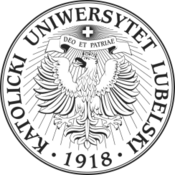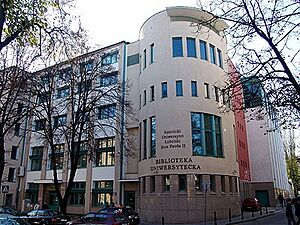John Paul II Catholic University of Lublin facts for kids
|
Katolicki Uniwersytet Lubelski Jana Pawła II
|
|
 |
|
| Latin: Catholica Universitas Lublinensis Ioannis Pauli II | |
| Type | Private Catholic university |
|---|---|
| Established | 27 July 1918 |
|
Religious affiliation
|
Catholic Church |
| Rector | Miroslaw Kalinowski |
| Students | 8,306 (2024) |
| Address |
Al. Racławickie 14, 20–950
,
,
|
| Affiliations | EUA Socrates-Erasmus |
| Website | kul.lublin.pl |
The John Paul II Catholic University of Lublin, often called KUL, is a university in Poland. It was started in 1918. Its full name in Polish is Katolicki Uniwersytet Lubelski Jana Pawła II. In Latin, it's Universitas Catholica Lublinensis Ioannis Pauli II.
History of KUL
The university was founded by Father Idzi Benedykt Radziszewski in 1918. This was the same year Poland became an independent country again. A leader named Vladimir Lenin allowed the priest to bring books and equipment from a religious school in Russia to Poland. This helped start the new university.
The main goal of KUL was to be a modern school. It wanted to combine science and faith in its studies. The university also aimed to train new Catholic leaders for Poland. The number of students grew from 399 in 1918 to 1440 by 1938.
However, World War II began, and Nazi Germany took over Poland. KUL was the only university in the German-controlled area that tried to stay open. But on November 23, 1939, the Nazis sadly executed some of its professors.
The university was then forced to close, and its buildings became a military hospital. Even so, teachers and students continued their lessons in secret. After the Red Army entered Lublin in July 1944, the university officially reopened on August 21, 1944. It has been open ever since.
KUL remained open even when Poland was under Communist rule from 1944 to 1989. This was a big achievement because Communist governments usually controlled all schools. KUL was the only independent Catholic university in the entire Soviet bloc (a group of Communist countries).
During the Communist years, the university faced many challenges. The government often bothered the school, especially in the 1950s and 1960s. Secret police watched the professors. Sometimes, the government would not allow certain departments to give out advanced degrees. It was also hard for KUL graduates to find jobs.
Despite these problems, KUL kept its independence. It never taught the Communist ideas that were required at other state universities. It also became a safe place for students who were kicked out of state schools for political reasons.
After Communism ended in Poland in 1989, KUL grew a lot. Its student population became four times larger, and its campus expanded. In 2010, the university had some issues with giving out PhDs (doctorate degrees) from departments that did not have enough professors to do so.
University Rankings
The university has been doing better and better in school rankings. In 2011, it was ranked 8th among all universities in Poland. Also in 2011, Wprost magazine placed it 15th among universities that focus on subjects like history and literature. Before that, in 2006, Newsweek Polska ranked KUL 54th among all Polish universities.
In 2011–2012, KUL's philosophy program was ranked first in Poland. It received special recognition and a lot of money in grants because of its high quality.
Famous People from KUL
Many important people have studied or taught at KUL.
- Pope John Paul II (Karol Wojtyła) is the most famous person connected to the university. He earned a special degree in theology in 1947. He also defended his doctoral paper on faith in 1948. He became a part-time philosophy teacher at KUL in 1954. He split his time between teaching in Lublin and his church work in Kraków. Even after he became an archbishop and then a cardinal, he stayed involved with KUL. His connection continued until he was elected Pope in 1978. All his important philosophical books were published in Lublin.
- Andrzej Szostek was a student of the future Pope. He later became a professor at KUL until 2020. He also served as the university's leader (rector) from 1998 to 2004.
- Stefan Wyszyński was a very important Cardinal and leader of the Catholic Church in Poland.
- Jacek Woroniecki was a theologian and philosopher. He was a Dominican priest who taught at KUL and was the university's leader from 1922 to 1924.
- Michał Heller is a priest, professor, and philosopher. He won the Templeton Prize in 2008 for his work.
- Józef Życiński was a priest and a Roman Catholic Archbishop. He was also a professor.
- Edward Stachura was a well-known poet and writer.
- Jerzy Popiełuszko was a Polish Catholic priest. He supported the Solidarity trade union, which worked against the Communist government in Poland. He is recognized as a martyr by the Catholic Church.
- Jerzy Kłoczowski was one of the most important Polish historians of the 20th century.
- Bogdan Borusewicz is a politician and senator. He disagreed with the Communist government and later became the leader of the Polish Senate.
- Kazimierz Nycz is a priest and a Roman Catholic Cardinal. He is the Archbishop of Warsaw.
See also
 In Spanish: Universidad Católica Juan Pablo II de Lublin para niños
In Spanish: Universidad Católica Juan Pablo II de Lublin para niños
- List of modern universities in Europe (1801–1945)
- Lublin Thomism


